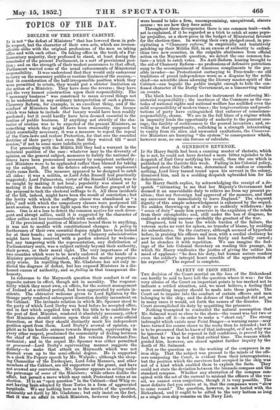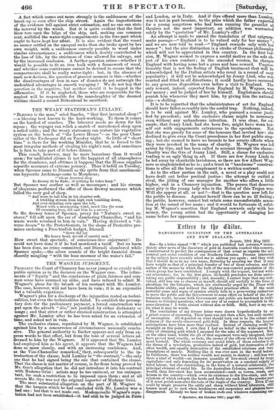SAFETY OF IRON SHIPS. "
THE decision of the Court-martial on the loss of the Birkenhead can hardly be said to have left the question where it was : for the very silence of the Court on important points is too marked not to indicate a settled attention, and, we must believe, a feeling that more searching inquiry should be made into those points. The Court sat to inquire into the conduct of certain officers and men belonging to the ship; and the defence of that conduct did not, as in many cases it would, set forth the causes of the disaster. The Court accomplished its duty by acquitting the prisoners.
Nothing transpired to contradict the natural assumption that Mr. Salmond went so close to the shore—the vessel was but two or three miles off it—in order to make a "short cut." The strong indraught which exists near Point Danger—a warning name—may have turned his course closer to the rocks than he intended ; but it is to be presumed that he knew of that indraught, or if not, why was he ignorant ? That he reposed in full confidence, is proved by the fact that he was in bed at that critical time. The reasons which guided him, however, are closed against further inquiry by the death of Mr. Salmond. Not so the question as to the working of the compasses in an iron ship. That the subject was present to the minds of the offi- cers composing the Court, is evident from their interrogatories; but the position which the survivors had occupied in the ship was not of a kind which enabled them to explain the facts. They could not state the deviation between the binnacle compass and the standard compass. Whether any aberration of the compass con- spired with the set of the current to mislead the officers of the ves- sel, we cannot even conjecture, though it is very possible. The most definite fact you arrive at is, that the compasses were "slow to come round." The question, however, is not buried with the Birkenhead, and it ought to be sifted to the very bottom so long as a single iron ship remains on the Navy List. A fact which comes out more strongly is the suddenness of the break-up so soon after the ship struck. Again the imperfections of the evidence tell against strict estimation, and no one can state the interval by the watch. But it is quite evident that the first blow tore open the bilge of the ship, and, making one common rent, nullified the water-tight compartments in the fore-part which ought to have kept her afloat. It is also evident that the vessel no sooner settled on the unequal rocks than she broke apart by her own weight, with a suddenness scarcely possible to wood under similar circumstances ; a suddenness which doubly contributed to the loss of life, by the strictness of time allowed for salvage, and by the increased confusion. A further question arises—whether it would be possible to fit an iron hulk with a framework of wood, and whether some contrivance cannot be devised to secure that the compartments shall be really water-tight: but, in the absence of such new devices, the question of gravest moment is this—whether the disadvantages of iron in ease of disaster do not outweigh the undoubted advantages in smooth voyaging ? We do not beg that question in the negative, but neither should it be begged in the affirmative. If it be neglected, those who are responsible for the neglect will be responsible for the manslaughter of the doomed victims should a second Birkenhead be sacrificed.



























 Previous page
Previous page